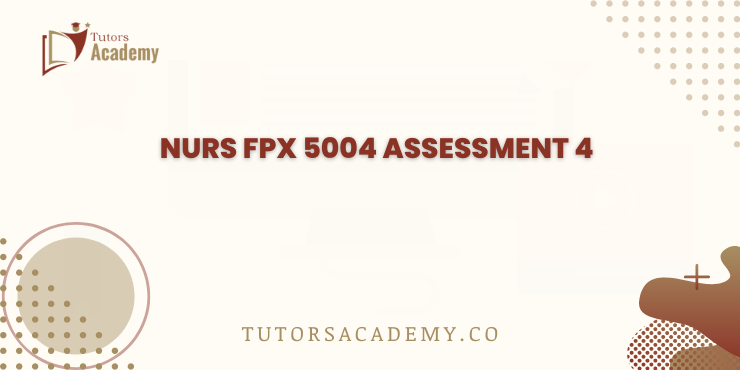
- NURS FPX 5004 Assessment 4 Self-Assessment of Leadership, Collaboration, and Ethics.
Self-Assessment of Leadership, Collaboration, and Ethics
Self-assessment of ethics, leadership, and teamwork in healthcare is critical for engendering both professional and personal growth. Healthcare professionals can identify areas for development, improve their ability to manage and cooperate effectively, and ensure compliance with ethical standards by critically analyzing their strengths and weaknesses.
The introspective approach, which is discussed by Cleary et al. (2020), promotes a well-rounded healthcare professional, empathetic and responsible. These experts stress the importance of patient care and add a lot to a positive, pleasant healthcare environment. The key focus of this comprehensive analysis is on the way ethical principles are employed to bring out better outcomes and in the evaluation of leadership characteristics.
Collaboration and Leadership Qualities Relative to Specific Experience
In my role as a Team Manager associated with the hypertension drugs trials of our company, I strived to have my leadership behaviors depicted on me as a healthcare professional and even the Transactional Leadership Model. The journey was mainly based on integrity, one of my key personal beliefs.
I ensured that our team followed the standards and ethical guidelines that control the conduct of medical research. This involved inculcating a climate of transparency and accountability so that all team members knew the importance of upholding the highest degrees of patient safety and data integrity.
In addition, I emphasized the importance of effective communication within the team and with external stakeholders. Clear and simple communication was vital for everyone involved to know their roles and duties as well as the objectives of the tests (Raurell-Torredà et al., 2021). I promoted an inclusive culture based on open discussions where ideas and fears could be freely presented and criticisms allowed.
NURS FPX 5004 Assessment 4 Self-Assessment of Leadership, Collaboration, and Ethics
As a leader, I supported my team by providing them with the necessary tools and motivation to perform well. I ensured each member received proper education and guidance and created opportunities for professional development and overall expertise improvement. My purpose in helping their growth was to help them be a significant part of the success of the trials.
The team’s backing, in return, supported me in pushing through impediments and bringing our objectives to a successful conclusion. A transactional leadership approach of setting clear expectations and appreciating accomplishments fostered a focused and motivated team spirit (Khairy et al., 2023). This approach was useful in tackling the complexity of conducting medical trials and ensured that our work was in sync with the company’s broader goals.
Leadership and Motivational Techniques
My Team Manager role within a hypertension trials team saw me using the approach of the four Rs of motivation—Responsibilities, Relationships, Rewards, and Reasons—on stakeholder participation inside the organization (Pike et al., 2020).
Initially, I ensured that every team member understood their role in achieving our objectives by assigning specific responsibilities to them, depending on their expertise and abilities. Similar to the Situational Leadership Model, this approach aligns the team members’ abilities and readiness with tasks (Wuryani et al., 2021).
Secondly, I emphasized developing strong connections among team members and with associated external parties such as regulators, physicians, and researchers. I acted similarly to the tenets of transformational leadership, which also emphasizes creating solid interpersonal bonds and an atmosphere for cooperation through faith and honesty (Jeong, 2020).
NURS FPX 5004 Assessment 4 Self-Assessment of Leadership, Collaboration, and Ethics
Finally, I established a system of rewards and recognitions to motivate and reward outstanding performances. This aligns with expectancy theory, which ties rewards and recognition to performance and is designed to ensure consistent excellence and efforts (Gelle-Jimenez & Aguiling, 2021). To cap it all, the Motivation was presented uniformly; the clinical trials are essential in developing hypertension treatment.
The latter was consistent with the concept of charismatic leadership, which stresses the importance of an attractive vision (Salas-Vallina et al., 2020) and helps stakeholders appreciate the broader impact of their work. By integrating these motivational tactics into my leadership approach, I created a productive team that cooperated, attracting the stakeholders’ interest and commitment to the medical study’s results.
This approach not only helped people work together more efficiently but also enhanced the efficiency and impact of our work in improving patient care and medical research.

Actions Taken in Response to Ethical Dilemma
I was a Team Manager overseeing hypertension medical studies when I faced a tough moral dilemma that required thoughtful analysis and commitment to ethical standards and leadership principles. This dilemma was regarding the clinical trial’s suitability for subject selection, namely informed consent and patient autonomy. I applied the beneficence, non-maleficence, respect for autonomy, and justice principles in an ethical context to resolve this dilemma, as noted in the ethical code of our profession (Cheraghi et al., 2023).
NURS FPX 5004 Assessment 4 Self-Assessment of Leadership, Collaboration, and Ethics
Following the principle of autonomy, I ensured that all potential participants were duly informed about the trial’s aim, potential risks, and advantages. This needed to ensure that people received detailed and clear information, allowing them to choose whether to participate or not (Xu et al., 2020).
Additionally, I ensured that the experiment was performed with the welfare of the participants as the top priority, that risks were minimized, and potential benefits were maximized, emphasizing beneficence and non-maleficence. I also applied some elements of the LEADS leadership model, particularly coalition building and results orientation (McLean, 2023).
To ensure that our hiring processes met legal and ethical requirements, I closely cooperated with our ethics committee and regulatory agencies. To promote the notion of justice, I established collaborative links. I received feedback from several stakeholders that assured equal and fair treatment of each participant.
Finally, the responses to this moral dilemma indicated an alliance to moral decision-making in a caring environment, influenced by the guiding and fundamental principles of our sector and traits of a good leader. This approach focused on the independence and welfare of the participants along with the trial’s integrity.
Conclusion
In summary, I realized the importance of aligning personal principles with professional guidelines after reflecting on my leadership, teamwork, and moral decisions as a Team Manager in the hypertension clinical trials. I integrated moral precepts and leadership styles into my approach to developing an ethical and united team climate.
Moving on, I’m still committed to self-betterment and will employ this awareness to confront new challenges honestly and empathetically. For complete information about this class, read more about our sample NURS FPX 5004 Assessment 1.
References
Cheraghi, R., Valizadeh, L., Zamanzadeh, V., Hassankhani, H., & Jafarzadeh, A. (2023). Clarification of ethical principle of the beneficence in nursing care: An integrative review. BMC Nursing, 22(1), 1–9.
https://doi.org/10.1186/s12912-023-01246-4
CLEARY, M., KORNHABER, R., THAPA, D. K., WEST, S., & VISENTIN, D. (2020). A Systematic review of behavioral outcomes for leadership interventions among health professionals. Journal of Nursing Research, Publish Ahead of Print(5).
https://doi.org/10.1097/jnr.0000000000000397
Gelle-Jimenez, M., & Aguiling, H. M. (2021). Leveraging human resources management (HRM) practices toward congruence of values. International Journal of Research in Business and Social Science (2147- 4478), 10(1), 85–94.
https://doi.org/10.20525/ijrbs.v10i1.987
Jeong, S. (2020). A cross‐level analysis of organizational knowledge creation: How do transformational leaders interact with their subordinates’ expertise and interpersonal relationships? Human Resource Development Quarterly, 32(2).
https://doi.org/10.1002/hrdq.21416
Khairy, H. A., Baquero, A., & Al-Romeedy, B. S. (2023). The effect of transactional leadership on organizational agility in tourism and hospitality businesses: the mediating roles of organizational trust and ambidexterity. Sustainability, 15(19), 14337.
https://doi.org/10.3390/su151914337
McLean, K. (2023). LibGuides: LEADS in a Caring Environment: Home. Library.nshealth.ca.
https://library.nshealth.ca/LEADS
Pike, M. A., Hart, P., Paul, S.-A. S., Lickona, T., & Clarke, P. (2020). Character development through the curriculum: teaching and assessing the understanding and practice of virtue. Journal of Curriculum Studies, 53(4), 1–18.
https://doi.org/10.1080/00220272.2020.1755996
Raurell-Torredà, M., Rascón-Hernán, C., Malagón-Aguilera, C., Bonmatí-Tomás, A., Bosch-Farré, C., Gelabert-Vilella, S., & Romero-Collado, A. (2021). Effectiveness of a training intervention to improve communication between/awareness of team roles: A randomized clinical trial. Journal of Professional Nursing, 37(2), 479–487.
https://doi.org/10.1016/j.profnurs.2020.11.003
Salas-Vallina, A., Simone, C., & Fernández-Guerrero, R. (2020). The human side of leadership: Inspirational leadership affects follower characteristics and work happiness (HAW). Journal of Business Research, 107, 162–171.
https://doi.org/10.1016/j.jbusres.2018.10.044
Wuryani, E., Rodlib, A., Sutarsib, S., Dewib, N., & Arifb, D. (2021). Analysis of decision support system on situational leadership styles on work motivation and employee performance. Management Science Letters, 11(2), 365–372.
Xu, A., Baysari, M. T., Stocker, S. L., Leow, L. J., Day, R. O., & Carland, J. E. (2020). Researchers’ views on, and experiences with, the requirement to obtain informed consent in research involving human participants: A qualitative study. BMC Medical Ethics, 21(1).
https://bmcmedethics.biomedcentral.com/articles/10.1186/s12910-020-00538-7
